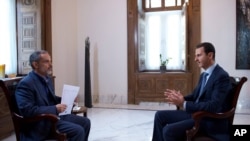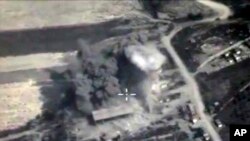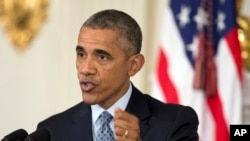Syrian President Bashar al-Assad said Sunday that the whole Middle East would be destroyed if Russia's aerial bombardment of militants opposed to his regime does not succeed.
"The alliance between Russia, Syria, Iraq and Iran must succeed or else the whole region will be destroyed," Assad told Iranian state television.
But he added that "the chances of success for this coalition are great and not insignificant."
Assad's comments came as Russia intensified its airstrikes against the insurgents. Moscow announced that it carried out 20 missions targeting 10 Islamic State training camps, arms depots and command posts in the last 24 hours in Idlib province.
The U.S., however, accuses Russia of seeking to support Assad by targeting Western-backed opponents of his regime, instead of Islamic State fighters that a U.S.-led coalition has been bombing for more than a year.
U.S. President Barack Obama said Friday that the United States would not conduct "a proxy war" with Russia in Syria. But one of Obama's chief foreign policy foes, Senator John McCain, told CNN Sunday that "of course" Washington and Moscow are already effectively engaged in a conflict in Syria.
"We don't have a strategy" in Syria, said McCain, the Arizona senator who lost the 2008 presidential election to Obama. He said Russia, by starting its aerial attack in Syria last week with only an hour's notice to Washington of its intentions, is "treating the United States with disdain and contempt."
Most of Russia's Sunday strikes were located in Idlib province in western Syria, while others hit near the de facto Islamic State capital of Raqqa near Syria's border with Turkey.
The Britain-based Syrian Observatory for Human Rights reported additional suspected Russian airstrikes Sunday in Homs and Hama, areas located south of Idlib.
Russia pledged Saturday to boost the aerial campaign it began late last week despite questions and criticism from Western governments that say Russian jets are largely bombing rebels opposed to Syrian President Assad and not Islamic State fighters.
British Prime Minister David Cameron reiterated his opposition Sunday, saying he welcomed Russia's help in the year-long campaign to fight the Islamic State, but that achieving security in the region will require an alternative to Assad's government.
"What is happening is that they are backing the butcher Assad, which is a terrible mistake for them and for the world," Cameron told BBC. "It's going to make the region more unstable, it will lead to further radicalization and increased terrorism, and I would say to them, change direction."
Britain's defense chief said Saturday that only 5 percent of Russia's airstrikes had targeted the extremists.
Obama: No proxy war
Even as Obama said Friday the Syrian conflict would not evolve into a proxy war with Russia, he denounced Russia's military engagement there, calling it a "recipe for disaster."
"(Russian President Vladimir Putin) had to go into Syria not out of strength, but out of weakness because his client, (Syrian President Assad) was crumbling and it was insufficient for him (Putin) to send him arms and money. Now, he's got to put in his own planes and his own pilots."
President Obama noted that the Russians do not distinguish between Islamic State militants "and a moderate Sunni opposition that wants to see Assad go. From their perspective, they're all terrorists." The Syrian government has long referred to the rebels as "terrorists" as well.
The president said this lack of distinction will have consequences for the Syria that emerges from the conflict, because the moderates will be needed to help run the country.
Obama said the U.S. will continue its current policies of attacking Islamic State, supporting Syrian moderates and working with the Turks along the border – and above all, seeking a political solution, which he said will “not be easy” but is “still possible."
Working toward political solution
Russian President Putin, French President Francois Hollande and German Chancellor Angela Merkel discussed Syria during a peace summit on Ukraine Friday.
The French leader said afterward that he told Putin that Russian airstrikes must target Islamic State positions and only those.
In a speech Friday at the U.N. General Assembly, Syrian Foreign Minister Walid al-Moallem said his government would participate in U.N. working groups to reach a peace deal, but also said it could not implement democratic reforms related to elections or the constitution while "fighting terrorism."
Efforts to find a resolution to the Syrian crisis have faltered for 4 1/2 years as the conflict spiraled from government crackdowns against protesters into a civil war and later a multifaceted fight with rebels, extremist groups and the military all battling one another other. Since March 2011, the conflict has killed more than 240,000 people and forced nearly 12 million others from their homes.






